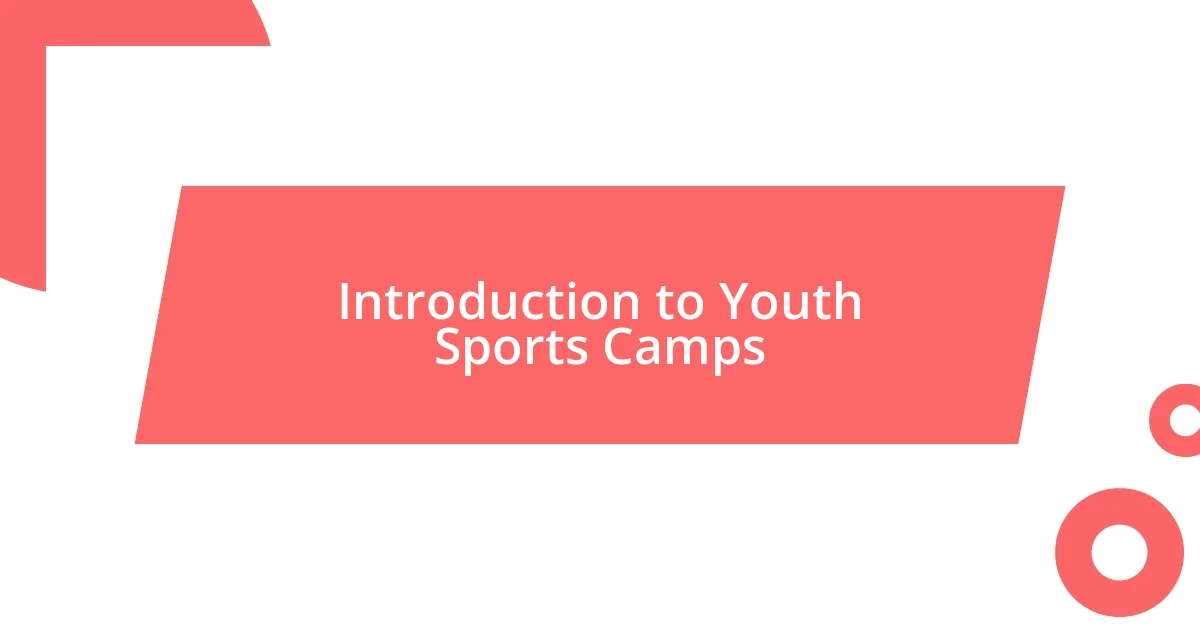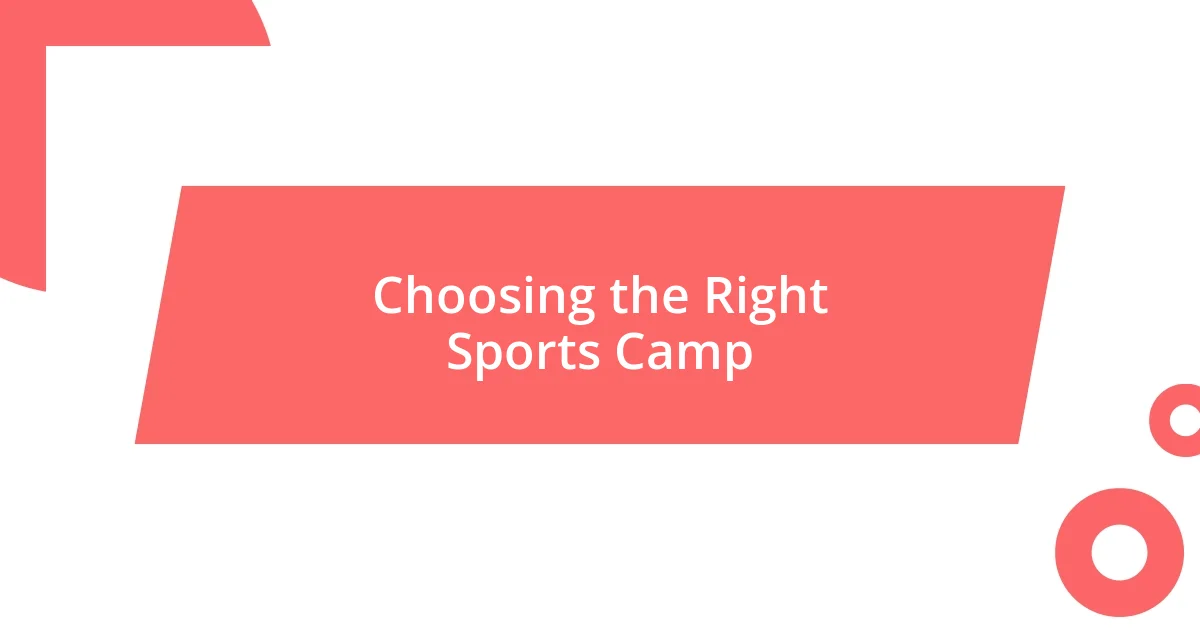Key takeaways:
- Youth sports camps promote not only skill development but also personal growth, teamwork, resilience, and healthy lifestyle habits.
- Choosing the right camp involves considering coaching style, camp focus (specialized vs. multi-sport), and the overall supportive environment.
- Maximizing camp experiences requires setting clear goals, actively engaging with peers and coaches, and reflecting on daily learnings to foster growth.

Introduction to Youth Sports Camps
Youth sports camps offer a unique opportunity for young athletes to hone their skills while fostering teamwork and sportsmanship. I still remember the rush of excitement when I arrived at my first camp; the energy was palpable, and it made me feel like I was stepping into a whole new world. These camps are not just about improving performance—they are also a space for personal growth and friendship.
At a youth sports camp, you learn so much more than just the technical skills of a sport. For instance, I had my eyes opened to the importance of perseverance during those summer days spent training under the sun. Isn’t it fascinating how a simple drill can teach you resilience? You’re not only mastering a game; you’re building character and confidence, which are crucial for life beyond sports.
What truly stands out in my memory are the bonds formed over shared experiences and challenges. There’s something incredibly powerful about working toward a common goal with your peers. Have you ever felt that sense of camaraderie? It’s these moments of togetherness that transform a sports camp into an unforgettable adventure, shaping who we become off the field as well.

Benefits of Attending Sports Camps
Attending sports camps can significantly boost a young athlete’s confidence and social skills. I recall how nervous I was during my first drills, but as I felt the encouragement from my coaches and teammates, something shifted within me. The result was a newfound belief in my abilities and the friendships I formed through shared challenges.
Here are some key benefits of attending sports camps:
- Skill Development: Coaches focus on technical skills specific to each sport, helping to refine techniques and improve performance.
- Teamwork and Communication: Camp activities foster essential collaboration skills as young athletes learn to work together toward common objectives.
- Resilience: The experience of facing challenges builds mental toughness, pushing kids to overcome obstacles, whether on the field or in life.
- Networking Opportunities: Camps connect kids with peers who share similar interests, laying the foundation for lasting friendships and connections in sports.
- Healthy Lifestyle Encouragement: Daily activities instill the importance of physical fitness and overall well-being, encouraging lifelong healthy habits.
These elements combine to create an environment where youth can thrive, growing into well-rounded individuals while pursuing their passion for sports.

Choosing the Right Sports Camp
Choosing a sports camp can be daunting, but it’s crucial to consider a few key factors. Based on my experience, the camp’s coaching style really mattered to me. I remember stepping onto the field and feeling an immediate connection or disconnect with the coach’s approach. A good coach not only teaches skills but also inspires confidence. What coaching style resonates with you? Look for camps that emphasize positive reinforcement and collective growth.
Another significant factor is the camp’s focus—specializing in a specific sport versus a multi-sport camp can fundamentally alter the experience. For instance, I fell in love with soccer at a camp that concentrated solely on that sport, allowing me to dive deep into technique and strategy. In contrast, a multi-sport camp encouraged a broader range of skills. Which do you think would suit your athlete better?
Finally, consider the camp’s environment. I vividly recall how the camaraderie at my chosen camp was palpable. Searching for a camp with a supportive atmosphere—where kids are encouraged to learn from mistakes and celebrate each other’s successes—made all the difference. Reflect on what kind of emotional environment would best suit your young athlete’s growth.
| Factor | Considerations |
|---|---|
| Coaching Style | Focus on positive reinforcement and inspiration |
| Camp Focus | Specialized vs. multi-sport options |
| Environment | Supportive atmosphere for learning and growth |

Personal Experience and Lessons Learned
One of my most memorable experiences at a sports camp was during a particularly challenging practice. I remember attempting a complicated drill and failing multiple times, feeling a mix of frustration and embarrassment. But my coach pulled me aside, reminding me that setbacks are part of growth. That small moment taught me not just about perseverance but also about valuing the journey over the immediate outcome. How often do we allow our mistakes to define us?
Looking back, I realize that the friendships I built at those camps were just as valuable as the athletic skills I acquired. I met individuals from various backgrounds, each bringing unique perspectives. I’ll never forget how we bonded over late-night talks and shared meals, laughing at our own silly mistakes on the field. Those connections instilled in me the importance of collaboration and mutual support, both in sports and in life. Can you think of a time when a friend helped you navigate a tough situation?
Another lesson I cherish is the importance of balance. While sports taught me discipline and dedication, they also reminded me to prioritize fun and enjoyment. There were instances when the pressure to perform weighed heavily on my shoulders, yet the most memorable moments came from simply enjoying the game with my teammates. This balance is something I carry into adulthood, and it serves as a reminder that passion should always be at the forefront of any endeavor. How do you strike a balance between responsibility and joy in your own life?

Tips for Maximizing Camp Experience
Taking full advantage of a sports camp experience requires a proactive mindset. I remember arriving at camp with a to-do list in my head—networking with coaches, observing play styles, and pushing my limits. Have you ever thought about what specific goals you want to achieve before stepping into such an environment? Setting clear, personal objectives can guide your experience and keep the focus on growth.
Engagement is a crucial aspect of maximizing your time. I’ve seen campers who blend in with the crowd, hesitant to voice their ideas or ask questions. I learned early on that actively participating in discussions—not just during practice but also during downtime—deepens your understanding and builds relationships. How open are you to sharing your thoughts? Embracing an open attitude towards interaction can elevate your entire camp experience.
Lastly, don’t underestimate the power of self-reflection at the end of each day. I made it a habit to jot down what I learned, what I enjoyed, and areas I could improve in my performance. This process helped me appreciate both my growth and my challenges. Have you ever taken the time to consider how daily experiences shape your development? Reflecting on these moments can unlock new insights and make every day at camp feel significant.

Conclusion and Future Considerations
As I think about my time at youth sports camps, I realize that the journey isn’t merely about improving skills or winning games. It’s about the growth I experienced, both as an athlete and as a person. I often wonder—how has your involvement in youth sports influenced your beliefs about teamwork and resilience? Reflecting on my own experience, those lessons have proven invaluable in various aspects of life, shaping how I navigate challenges and relationships.
Looking ahead, I believe future sports camps should continue evolving to meet the diverse needs of young athletes. I remember when my camp introduced mental training sessions, focusing on visualization and mindfulness. This was a game-changer for me. What innovations could help the next generation of campers tap into their full potential? I see a bright future if camps embrace the full spectrum of athlete development, including mental, emotional, and social skills alongside physical training.
In considering how to improve these experiences, it’s essential to foster an inclusive environment that welcomes all voices. I’ve seen firsthand how a culture of support can uplift everyone involved. Have you ever felt that sense of belonging in a group activity? I often think that if each camper felt empowered to share their unique perspectives and stories, the collective experience would undoubtedly become richer. Moving forward, let’s advocate for inclusivity, ensuring every young athlete has the chance to shine.















